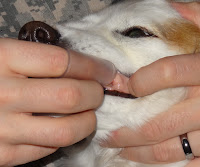Dental cleanings by your veterinarian are necessary, just like going to your dentist for cleaning periodically is necessary. But just like your own teeth, oral health really starts at home.
There are many things you can do to keep your pet's mouth healthy between cleanings, and while none will eliminate the need for occasional professional cleaning, you can certainly reduce how frequently they are needed. Given that cleanings at the vet aren't cheap (though they are a great value, considering what your dentist charges without anesthesia), a little work at home can pay off on your pocketbook. Anesthesia is relatively safe nowadays but it is never without risk, so reducing how often it is necessary (again, it is necessary) is good for your pets as well. Home care also means you are paying attention to your pet's mouth, and this may be the biggest benefit of all - you are far more likely to catch problems that need veterinary attention early.
Tooth-brushing
 |
| Most pets tolerate brushing well. |
Brushing your pet's teeth is generally not a big deal; most will tolerate it without much training on your part (cats included!), and many even seem to enjoy it. There are a wide variety of small brushes available at pet stores or online, and your vet likely stocks some as well. You don't need anything fancy, just something with a brush that your pet will tolerate. Personally, I find many animals take best to the thimble-style brushes you wear on your finger. Also, don't use human toothpaste as they contain stuff not meant to be swallowed. Many flavors of pet toothpaste are available, too, and with uncooperative pets finding something tasty can turn brushing from an argument to a treat.
 |
| Make sure to get those molars. |
Diet
Yes, there's plenty of evidence that dry diets result in better oral health than soft foods. A recent Polish study also indicated better oral health in dogs and cats feed commercial diets versus home prepared foods. Both Hill's and Purina make prescription diets proven to significantly reduce plaque and calculus retention; typically these are large kibbles designed not to bust up easily when bitten. Your pet actually bites through them, mechanically scraping the tooth on the way. If your pet doesn't have special nutritional needs that make another diet necessary, these really are great for oral health. Some similar diets are available over the counter, too. Anyone can put a claim on a label and take your money, though, so check out the Veterinary Oral Health Council website to see which have been proven effective.
Chews & Other Products
Many studies have indicated that dental chews can improve oral health; which ones work best is a common question, and one I can't give a definitive answer to. One thing to keep in mind - the whole idea is to get that chew scraping against the pet's teeth, so something they don't bite into is by default only working on the flat surface of the tooth, and the gumline is what's most important. Anything too hard (i.e. - bones) can risk tooth fractures, not to mention there's always the concern of swallowing something large or sharp. Rawhide is probably my go-to product, but there are plenty of other good options. Chews impregnated with chlorohexidine, an effective antiseptic, are also on the market; rinses and gels are available as well.
 |
| The VOHC product seal, for reference only. |
No comments:
Post a Comment